Much of the criticism of Darryl Cooper so far has been to attack him as a Nazi. I will try something different.
Many people love Hitler, sometimes secretly, and other times openly. Does Darryl love Hitler? Instead of assuming so, as is the popular line of attack, I will take him at his word. I will instead critique his arguments.
If I am wrong to trust Darryl, and he really does love Hitler, then maybe I am not the right man for the job. Maybe the only solution is “cancel” him without any time wasted on argumentation. Either way, screeching hysterically isn’t really my style. I also don’t think that morally condemning Cooper is the best way to discredit his ideas. We can call him Nazi, racist, evil, and immoral, but if we do not challenge his ideas thoroughly and directly, then this will only amplify his standing among conspiracy theorists like Candace Owens. “They only attack him personally, but they can’t defeat his ideas!” Not good.
There are, by now, millions of articles saying “wow, just wow” at Darryl’s supposed Naziism. This will probably hurt Tucker’s brand, and may even lose him some opportunities in the future. I’m not writing this article to defend Cooper, or Tucker, but rather to approach his arguments from a factual, rather than moral, angle.
There are a number of people who are unaffected by moral shaming when it comes to abstract concepts outside of their immediate reality. You might find this fact unfortunate, but it is true. If you persist in accusing them of being a bad person, with more brutal and violent ad hominem, this is unconvincing to them. It only repels them and makes them dig in their heals.
This group of people is small, and I could be accused of wasting my time by directing my intentions toward that audience of stubborn, disagreeable amoralists. Some of them are already convicted antisemites, and they will disregard what I say.
Nonetheless, driven by careless optimism, I will write this article with that audience in mind: people who are incredibly disagreeable and who refuse to be convinced by moral threats. Most of them probably won’t listen, but that’s ok. Writing this article is the equivalent of me scratching off a thousand lottery tickets. Maybe today is my lucky day.
tl;dr
Churchill didn’t lead America into war. America led Churchill into war.
Was Hitler right?
There were three powers in 1939: Russia, Germany, and America. Britain (for reasons I will explain in detail) had a choice between allying with two of these powers: America and Germany. Britain chose America. This wasn’t because of Zionists, as Darryl alleges, but was largely due to the fact that the American and British elite shared an ethnic and religious heritage spanning over 1,500 years of shared history. They were the same tribe and the same people, according to Hitler:
“England's position cannot be compared with that of any other State in Europe, since it forms a vast community of language and culture together with the U.S.A.”
And yet, according to Hitler, “from the political point of view it is not in the interests of Great Britain that Germany should be ruined.” I will quote some characteristic passages from Mein Kampf:
“It is true that a British statesman will always follow a pro-British and not a pro-German policy; but it is also true that certain definite interests involved in this pro-British policy may coincide on various grounds with German interests.”1
In England, despite the ties of kinship, there was a certain amount of jealousy and anxiety over the growing importance of the United States in all spheres of international economics and politics. What was formerly a colonial territory, the daughter of a great mother, seemed about to become the new mistress of the world. It is quite understandable that to-day England should re-examine her old alliances and that British statesmanship should look anxiously to the danger of a coming moment when the cry would no longer be: "Britain rules the waves", but rather: "The Seas belong to the United States"…
Should a day come when the die which will finally decide the destinies of the nations will have to be cast in that country, England would be doomed if she stood alone. Therefore she eagerly reaches out her hand to a member of the yellow race [Japan] and enters an alliance which, from the racial point of view is perhaps unpardonable; but from the political viewpoint it represents the sole possibility of reinforcing Britain's world position in face of the strenuous developments taking place on the American continent.
Hitler is very clearly laying out the stakes of a naval competition between America and Britain.
naval power and finance.
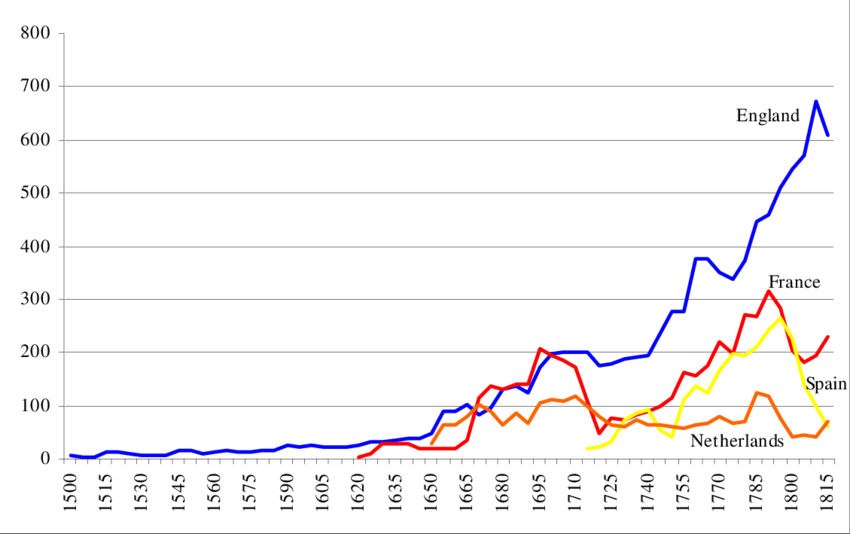
As this graph shows, there was a period in the 17th century where the Netherlands could be considered among the great naval powers of the world. In 1602, the Dutch established the United East India company, which was one of the first companies in the world where "stocks" of the company could be bought and sold by “shareholders.” This fact will be key for our analysis: naval power and financial power are deeply intertwined. Global naval supremacy and global financial supremacy are, since the 17th century, one in the same.
Shortly after the creation of the Dutch East India Company, the Amsterdam Stock Exchange opened in 1606. It is relevant at this juncture to highlight the importance of Jews as financial specialists, facilitating the function of these new institutions. Joseph de la Vega, for example, was one of the first writers to describe the art (or science) of financial speculation, in his book Confusion of Confusions (1688). From the very beginning, this field was not for the faint of heart.
Joseph was part of a community of Sephardic Jews who fled from Spain to the Netherlands during the Inquisition. The emergence of the stock exchange was not a Jewish conspiracy to defraud the world and destroy Europe. Instead, Jews were recruited and attracted to the field because of their value as accountants, bankers, merchants, experts, traders, technicians, and analysts.
The Netherlands, which was revered for its tolerance, benefitted from financially-skilled Jewish immigration. Similarly, Cromwell’s decision to invite Jews into England attracted financial experts, who assisted Britain in establishing its own stock exchange and colonial empire. These immigrants were desired to fulfill a massive demand for financial workers as the Netherlands and Britain began to financialize with the expansion of naval empires.
what is finance?
While my purpose here is not to explain the process of financialization in totality, I will very briefly attempt to indicate the mechanism behind financialization, and why it was so closely tied together with naval expansion. Financialization is the result of the abstraction of the economy. Instead of holding gold bars in a vault, you hold shares of a stock.
Why did this become necessary? As empires expanded, distances expanded with them. A vast ocean lay between Europe and its colonies. The result was that, in order to coordinate investors at home with profits abroad, some greater degree of abstraction became necessary.
Of course, earlier empires had their own financial systems, and currency itself is nothing more than an abstraction! Financialization merely describes the expansion of abstraction, as occurs with the expansion of the economy across time and space. Without financialization, the sort of long-term and long-distance investment required to found new colonies would have been much more difficult.
dutch VS english.
In 1624, New Amsterdam was founded, which is today called New York City. In 1661, Asser Levy became the first Jewish homeowner in New Amsterdam. Peter Stuyvesant, an antisemite, attempted to reject Jews from the colony, but they were aided by the powerful assistance of the Dutch West India Company, which recognized their value to the Dutch colonial enterprise.
By 1664, New Amsterdam was one of the largest cities in North America, with 9,000 people. Had the Dutch maintained their naval supremacy, the largest city in North America (the most important in the world) would be speaking Dutch, not English. Unfortunately for the Dutch, they lost their naval supremacy, and with it, their financial supremacy.
When Hitler states that Britain was threatened by American naval power, the importance of this threat should be considered in its financial context. The replacement of Britain with America as the world’s pre-eminent navy would result in the transfer of the financial center of the world out of London and into New York. This process had already begun in 1907, when Teddy Roosevelt shocked the world with his “Great White Fleet.”
The circumnavigation of the globe by America’s navy was a deliberate provocation and act of aggression, part of Roosevelt’s doctrine of “speak softly, and carry a big stick.” Roosevelt, like his successors Wilson and FDR, believed in an expansive, imperial America, which would someday dominate the global as the “shining city on the hill,” and “leader of the free world.”
By this time, Roosevelt was preparing for two potential “world wars”:
The general outbreak of war in Europe, repeating the disasters of the Napoleonic Wars (1803), The Seven Year's War (1754), and The Thirty Years' War (1618).
The outbreak of war in the Pacific with Japan, following Japan’s victory in the Russo-Japanese War (1904)
The first war came first in 1914, while the second came in 1941.
Critics of Roosevelt, Wilson, and FDR claim that America should have constrained itself to the American continent, and avoided expansion into Europe or the Pacific. However, the transition from terrestrial expansion (Westward Expansion) to naval expansion was merely an extension of America’s frontier spirit of Manifest Destiny. To reject this idea is to reject America itself.
Cooper admits that his arguments are derived from Catholic paleo-con, Pat Buchanan. There has always been a strain of “isolationism” in America’s political history, as cited in Washington’s warning against “entangling alliances.” But this warning is taken out of its proper context: Washington was speaking to a new-born nation, without naval supremacy, which had not yet conquered the continent.
Washington’s advice was meant to help focus American efforts on conquering the continent. He had not yet envisioned an American “from sea to shining sea,” and thus cannot be blamed for limiting the scope of his foreign policy advice. Yet this quote has been exaggerated and abused by Nazi, Soviet, Russian and Chinese propaganda, which have kept “isolationism” alive today, in opposition to the authentic spirit of America.
Hitler had no illusions or moral objections to America’s imperial ambitions. His diplomatic efforts with the British sought to convince them that, unless they allied with Germany, they would become a junior partner to the Americans. Hitler was right.
The question at hand is this: which is worse?
Becoming a junior partner to America;
Becoming a junior partner to Germany.
america VS germany.
There was a huge contingent of the British aristocracy which was explicitly and fanatically pro-Nazi. They loved Hitler, and wished to ally with him. On the other hand, there was an equally opposed portion, which sought an alliance with America. Finally, among the “commoners,” there was a strong Labor Party contingent which sought an alliance or at least a tacit détente with either America or the Soviet Union (but certainly not Germany).
By 1939, the pro-American and pro-Soviet position had won out, but by what margin? How close was Britain to allying with Germany instead? Assessing the exact power of each of these groups is difficult. Darryl Cooper claims that it was “Zionists” who seduced Churchill with bags of cash to declare war on Hitler. But, in fact, Churchill never declared war. He merely continued it.
Should Churchill have ended the war? In Cooper’s opinion, yes. However, Cooper’s assertion that “it was in Britain’s interest to end the war” fails to examine the arguments put forth both by British Labor and the proponents of an Anglo-American alliance.
British labor.
The British Labor Party was not animated by Zionists, as Cooper alleges. Instead, it was a coalition of socialists, libertines, homosexuals, free-thinkers, Freemasons, and pantheists.2 Many in the Labor Party were pacifists, and opposed war on principle. The pacifists were especially strong when Germany and Russia were on the same team. However, with Operation Barbarossa, these leftist pacifists quickly shifted their support toward the war. Churchill had evidence of Barbarossa in advance, and understood that this would only increase political support for a continuation of the war.
Aldous Huxley is relevant to mention here. While he was not prominent within the Labor Party, he represents one of the diverse currents of left-wing thought which was powerful within Britain at that time.
Sensitive intellectuals like Huxley were disgusted by both Naziism and Communism, but considered Naziism to be the more proximate threat. Additionally, these “anti-authoritarian” leftists believed that American democracy was the best hope for human progress. To argue that men like Huxley were mere puppets of “Zionists” is to deny them agency as freethinkers. Claiming that leftism is a mere product of Jewish tricks implies that white gentile elites are dumb and easily misled. I give men like Huxley more credit. In ignoring the significance of the British intelligentsia, Cooper ignores fundamental ideological reasons why peace was not in Britain’s interest.
British finance.
By 1939, the British and American financial systems were so intertwined that an alliance with Germany would have brought the threat of sanctions and eventual losses. Germany, for its part, had disentangled itself from international finance. Since it did not have any overseas or naval colonies, this was a relatively simple task. But for Britain, who depended on international markets to manage its colonies, abandoning the global stock exchange would be equivalent to losing the colonies. Britain was faced with a choice:
Ally with Germany, and lose your colonies?
Or, ally with America, and lose your colonies?
This answer was especially one-sided for British aristocrats, whose wealth was largely tied up overseas. America today launches sanctions specifically targeting “Russian oligarchs,” rather than the entire Russian economy. Similarly, the result of an alliance with Germany would have been a series of “targeted sanctions” which would have disproportionately damaged the assets of the British ruling class. An alliance with America, however, cushioned the fall.
The British ruling class, from 1939 to 2024, are no less rich today than they were before the war. The British Empire as a military entity no longer exists, but London as a financial entity is still alive and kicking. Hitler’s plans for the de-financialization of the economy would have been ruinous for British elites. The choice was clear — and it wasn’t Churchill who made that choice. He merely was the executor of elite will.
what if Churchill was a coward?
In 1940, Churchill had the opportunity to sue for peace, as Cooper suggests. Hitler did make peace offers. Peace with Hitler would have meant the defeat of the Soviets and the survival of the British Empire, according to Cooper (Buchanan). I contest this point, arguing that American troops may have landed in Vladivostok to reinforce Stalin, had there been no front in Europe. Hitler’s plans for de-financialization would have resulted in the ruin of the British elite. But suppose Cooper is right, and I am wrong. Could Churchill have sued for peace, against the will of the British elite?
Cooper gives Churchill more credit than he deserves. Churchill was not a singularly powerful figure — he was a subject of the king, and could be deposed by the parliament. The idea that Churchill could have defied king and parliament, and the whole British aristocracy, and sued for peace, is laughable. It is true that there were British elites, like Moseley, who wished to sue for peace, but they were rotting in jail or “exiled” like Edward at that point. The die was cast. It was too late.
Cooper’s fantasy that Churchill could have sued for peace implies that “Britain’s interests” can be considered absent of elites. In my opinion, however, it is the elites of a country, and not the people, who truly constitute its interests.
There are occasions where countries do rationally sue for peace. For example, when they are on the brink of destruction, or where the consequences of a retreat are not too great.
For example, Stalin called off his invasion of Finland during the Winter War. The Finns were, pound for pound, probably the greatest army on the face of the planet. Finland, the jewel they protected, had little natural resources. In the face of high losses and low reward, Stalin gave up. The Soviet Union was not “defeated,” but decided to expend its resources elsewhere, in preparation for a military build-up against Germany.
In 1940, Britain was nowhere near defeat. Its air force was flying over Germany, and it fiercely defended Britain during the Blitz. The Royal Navy was strong. Germany had no hope of invading Britain. With this being the case, Britain looks much like Finland: a country without much offensive capability, but a strong defense. To give up then, when American or Soviet involvement was all but certain, cannot be justified on humanitarian grounds, as Cooper seeks to do. Had Germany defeated the Soviets, as Cooper wishes, no fewer people would have died, and Britain, even as an ally of Germany, would have still lost its colonies to overwhelming American naval power.
american anti-colonialism.
In my article on globalism and colonization, I argue that America was inevitably going to liberate Britain’s colonies as a matter of geopolitical necessity. If Britain refused to ally with America, America would have achieved decolonization anyway. “We can do this the easy way, or the hard way.”
The easy way would be an alliance with America. British elites would still have access to international markets and financial systems. They would maintain their wealth. The British military would be integrated into an alliance with America. The hard way would be an alliance with Germany. America would invade Canada, Australia, and even Africa, liberating British colonies one by one, and transform Russia into a proxy state. Instead of maintaining access to international markets, the British would be punished and shut out.
There were, as I have mentioned, Jewish members of the British financial elite, side-by-side their Anglo-Saxon compatriots. But they were never, at any time, in possession of the majority of elite British wealth and power. Overrepresented, perhaps, but they never had a controlling share of political power. The final decision to defeat Hitler was made by the aristocracy and the King. To reduce British financial interests to “Zionism” alone is inaccurate.
what did Hitler get wrong?
Cooper might choose to shift the goal posts of his argument. Perhaps by “Zionism,” he is really referring to all forms of international finance, whether Jewish or gentile in origin. Maybe, like Alex Jones, by “Zionists” he really means “globalist elites.” Or, like Candace Owens, he believes they are not “real Jews,” but “Frankists!” Cooper, like many critics of Britain, might hate the “Anglo-Zionist” banking system on the basis of his opposition to capitalism. A quote from Hitler describes these typical Anglophobic attitudes:
“The delusion was so profound that the Englishman was looked upon as a shrewd business man, but personally a coward even to an incredible degree. Unfortunately our lofty teachers of professorial history did not bring home to the minds of their pupils the truth that it is not possible to build up such a mighty organization as the British Empire by mere swindle and fraud.”3
Yet Hitler, despite being accurate on a number of geopolitical points, makes the same fundamental error as Cooper, when he gives Jews the entire credit for the British financial system:
From the political point of view it is not in the interests of Great Britain that Germany should be ruined even still more, but such a proceeding would be very much in the interests of the international money-markets manipulated by the Jew. The cleavage between the official, or rather traditional, British statesmanship and the controlling influence of the Jew on the money-markets is nowhere so clearly manifested as in the various attitudes taken towards problems of British foreign policy. Contrary to the interests and welfare of the British State, Jewish finance demands not only the absolute economic destruction of Germany but its complete political enslavement.4
In Hitler’s obsession with Jews as the metaphysical source of all evil, he ignores the influence of America upon Jews. Since America’s founding, it was seen, by Jews from Spain to Russia, as a uniquely safe and tolerant haven. This won America the love and admiration of Jews around the world. Jews in Britain desired an alliance with America, not just because they detested Hitler, but because they genuinely loved America. Rather than Churchill leading America to war, it was America that led Churchill; rather than Jews seducing America into war, it was America that seduced the Jews.
The strategy of economic neo-colonialism, pursued by America, has proven itself to surpass the old British policy of “military colonialism” pursued by Britain, at least in its ability to generate wealth for financial elites. The American plan for global financial domination, which has today become successful, was already long in motion before Hitler presented his peace plans to Churchill.
The overrepresentation of Jews in finance, a story as old as Christendom itself, does not allow for us to accurately characterize finance as essentially Jewish, unless we wish to dismiss, degrade, and ignore the accomplishments of gentile financiers. Jews and gentile elites have existed in syncretic cooperation since the early medieval period.
Ironically, Hitler and Cooper, in equating finance with Zionism, buy into a myth of “Jewish supremacy” far exceeding reality. To be blunt, Jews simply aren’t smart enough to hoodwink white elites. To say otherwise is go far beyond Cofnas into the realm of fantasy. Frankly, I find this myth of the “dumb white elites” to be offensive to the intelligence of the men who built western civilization.
Hitler’s opposition to finance doesn’t come out of stupidity, or an inability to become a stock trader. If it was Hitler’s desire, he could have gotten a job at a bank. He refused to do this, however, because he was an artist, a romantic, and a visionary, and opposed to bourgeois financial values. He envisioned a Neuordnung of medieval knights and eugenic breeding.
Cooper, by contrast, hesitates to endorse any program or vision. He snipes from the sidelines: “well ackshually, Churchill was bad too!” He does not put forth any positive vision of this world.
For good or for evil, National Socialism was an ethos. Darryl Cooper, by contrast, portrays himself as an objective historian, without strong biases or ideological commitments. What does he stand for, exactly? His self-reported personal friendships oscillate wildly between Naziism and Stalinism. The only common thread here is a resentful demoralization campaign against the American Empire.
This is not to say that Churchill was a perfect man, or that America is above criticism. But to say that “Churchill was the villain of the Second World War” is to overstate his role, as if he somehow seduced America into a grave mistake. No: America conquered the world by force of arms and strength of will. It was not a mistake, or the result of seduction. Teddy planned it; Wilson started it; FDR completed it.
There are many figures we can blame for the British declaration of war against Germany. George VI stands out as a pivotal figure. Without his consent, war could have never occurred. We can blame the British financial aristocracy, which certainly contained some Zionists, but was never majority Jewish. We can blame Anglo-American dual citizens, or British of American ancestry. Churchill himself was the son of an American woman, Jeanette Jerome. But he was not alone, and these individuals worked together tirelessly to establish an alliance between Britain and America. Churchill, for his part, was only a figurehead who merely stayed the course.
Perhaps Cooper has consumed too much pro-Churchill propaganda, which portray him as a “lone voice in the wilderness, standing against the Nazi menace.” Cooper has inverted this myth to make another, equally absurd: that Churchill alone is responsible for Britain’s continuation of war. This myth does not stand up to scrutiny.
Is Darryl Cooper is “the best and most honest popular historian in the United States”? If so, this reflects very poorly on the state of that profession. I do not think we can take his thesis seriously, that Churchill alone prolonged the war, or that the war was not in Britain’s interest, in light of all the facts. I invite Darryl to debate me on this subject, so that we can examine the full context and scope of the Anglo-American alliance, outside of petty myths and fables.
Thanks for reading!
Writing this blog is my full time job, and my only source of income comes from reader donations. If you liked this essay, consider subscribing and making a yearly or monthly donation. Since I write hundreds of articles per year (plus special paywalled posts), the cost is about a quarter per gumball.
Besides financial assistance, it always helps to like, comment, and re-stack, as this boosts visibility and expands my reach. Thank you.
The article is over.
Hey, what are you still doing here? Shouldn’t you be in the comments section already?
What?
You want more? Something fun? Something crazy?
Ok, as long as you don’t tell anyone… I have a secret for you, which is really only relevant to this article, and I won’t have another chance to talk about it until Tucker brings on another WWII revisionist. It is a conspiracy about WWII… Are you interested? Ok, fine, I’ll tell you my conspiracy theory! But you have to promise not to take it into account when you complain about how my articles are “long winded, unstructured, meandering, all-over-the-place, stream-of-consciousness…” This is just between you and me. Here it is:
the Bessie conspiracy.
The British were divided. Edward VIII, King of England, was a friend to Hitler and a foe to America. Had he remained king, history would have turned out very differently. But oddly, curiously, and coincidentally, he married an American divorcee, which resulted in his abdication. How did this come to be?
I have a conspiracy theory regarding this matter: Bessie Warfield was effectively an American agent, sent to seduce the pro-Nazi king and remove him from the throne. This plot required coordination between British and American spies, or “socialites,” as they are discreetly called.
Throughout history, prostitutes have been used extensively as spies and secret agents. Sometimes they remain deep under cover for decades, and other times they used to procure information without "knowing what they do." I will not argue that Bessie Warfield understood, consciously, that she was being used for this purpose. I will simply argue that she was put in the right place, at the right time, with predictable results.
Bessie’s upbringing was unusual. She was conceived out of wedlock, and it is not clear if this is because of premarital sex, or if her mother, Alice Montague, had an affair. Five months after she was born, her (legal, but unknown if biological) father, Teackle Warfield, died. Teackle’s brother, Solomon Warfield, then became the effective “caretaker” of Alice Wallis and her young daughter. He was a wealthy bachelor, and the stereotype at the time was that unmarried wealthy men tended to be gay or libertine. This was her family background, and it informed her future.
When Bessie was 9 years old, her mother Alice married a prominent political boss, Isaac Rasin. Rasin’s “Maryland Machine” was reminiscent of Tammany Hall, and used open bribery, called “walking around money,” to secure elections. Rasin later died, and Alice married a third time, to Charles Gordon Allen.
In school, Bessie pushed herself to be best in class. She was extremely driven and ambitious. When she had a target in sight, he pursued it fanatically, whether it was a good grade or the seduction of a man. At the age of 20, she married Earl “Win” Spencer Jr., a well known alcoholic and commander of the San Diego Air Station. After divorcing Bessie, "Win" went on to re-marry four more times. This reflects a pattern in Bessie’s life, where the men she would pursue would tend to be less than monogamous.
By 1922, Bessie was engaged in an affair with Felipe de Espil, a diplomat from Argentina. After this affair, she began traveling in China. During her “Chinese era,” it is alleged that she had an affair with the fascist Galeazzo Ciano, became pregnant, and had an abortion which rendered her infertile. This is contested by Bessie’s defenders, but in the absence of hard material evidence, we will at least admit that Bessie was exceptionally close with this Italian fascist.
It is possible that Bessie became close to Galeazzo simply as a result of her own preferences and predilections, but it is also possible that her association with him was in connection with a desire on the part of American intelligence to conduct espionage against Italy. The cities of Beijing and Hong Kong, at this time, were flooded with foreign spies, in a similar manner as depicted in Casablanca (1942).
It is possible that Bessie was in direct contact with American spies, who used her to get information on the fascist inner circle, but it is also possible that she was unaware of how she was being used. For example, Bessie might write letters detailing her conversations with Galeazzo, or American spies might attempt to extract information from her without revealing that they were spies. In either case, the result is the same: Bessie Warfield’s pattern of life fits neatly into existing American intelligence operations. She was, at the least, a “person of interest.”
In 1927, Bessie became involved with Ernest Simpson. Simpson was of Jewish heritage, born in America, but later became a British citizen during the First World War. He was a married man at the time. His wife, Dorothea Webb Parsons (m. 1923), had already divorced James Dechert in 1920. Ernest and Dorothea divorced in 1928. The pattern that is emerging here is that Bessie Warfield’s close circle was filled with a historically unusual level of divorce and promiscuity. It was usual for men to have affairs, but to divorce openly and remarry was not quite yet socially acceptable.
Ernest and Bessie would later divorce, but the divorce was quite odd. One would think that if a husband cheats on a wife with his wife’s best friend, there would be some falling out. But instead, Ernest and Bessie remained lifelong friends after the divorce.
The best friend in question was Mary Kirk. Mary was a childhood friend of Bessie, and Bessie introduced Mary to Ernest in 1925. The divorce between Ernest and Bessie was a plot devised between the three of them: Ernest and Mary ordered a hotel publicly together, which was as "evidence of adultery" in order to obtain a divorce. The whole thing, from the outside, seems to have been a sham. It wasn’t a matter of “falling out of love,” but a deliberate and coordinated “switcheroo,” where Ernest traded out Bessie for Mary, with Bessie’s consent, so that Bessie could be free to marry Prince Edward. This sounds bizarre in 2024, let alone in 1937. But for prostitutes and spies, these “court intrigues” were part of a bigger plan.
By 1931, Bessie was finally introduced to the final target, Edward, Prince of Wales. By 1934, Edward fell in love. At that moment, Edward’s fate was sealed, and he would eventually be forced to abdicate in shame.
Bessie, by all accounts, acted as a dominatrix toward Edward, as prostitutes often do. This fit a pattern in Edward’s life, as his earlier loves included Marguerite Alibert, a French prostitute who shot her husband. Edward loved being dominated by strong women. Bessie was the perfect woman to woo him, and force him off the throne.
It wasn’t just the Americans who were engaged in marital conspiracies. Hitler also attempted to find a suitable wife for Edward. In 1934, he attempted to arrange a marriage between Edward and Frederica of Hanover, in order to give Edward a German bride and prevent the outbreak of war. But he was less skillful than the Americans in his matchmaking abilities.
back to reality.
It is fun to speculate on the role of Bessie Warfield in bringing America and Britain into an alliance. In either case, these entertaining anecdotes are not necessary to understand larger, structural facts. I hope that my wild speculation hasn’t caused you to discount my serious arguments, which are back up by facts and logic. Now, the article is actually over! To the comments section!
MK, page
A characteristic anecdote: Henry Mustin (cousin of Bessie Warfield), commanding officer of the USS Samar, was court-martialed for sleeping on the job. But Teddy Roosevelt heard that he was only sleeping because he got in a British sailor the previous night for insulting the United States Navy. Teddy immediately pardoned him and restored his rank.
It should be said that none of these things were, at that time, contradictory with Zionism, although it seems to be so today.




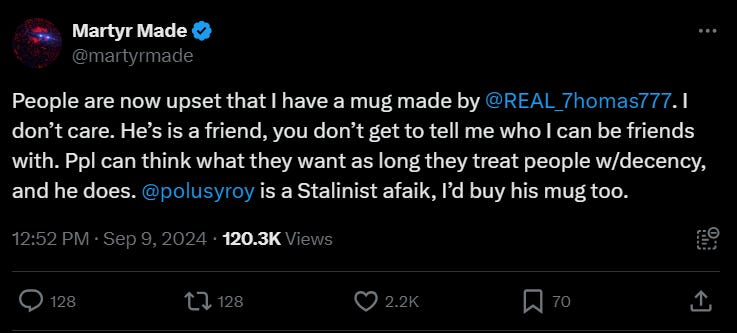

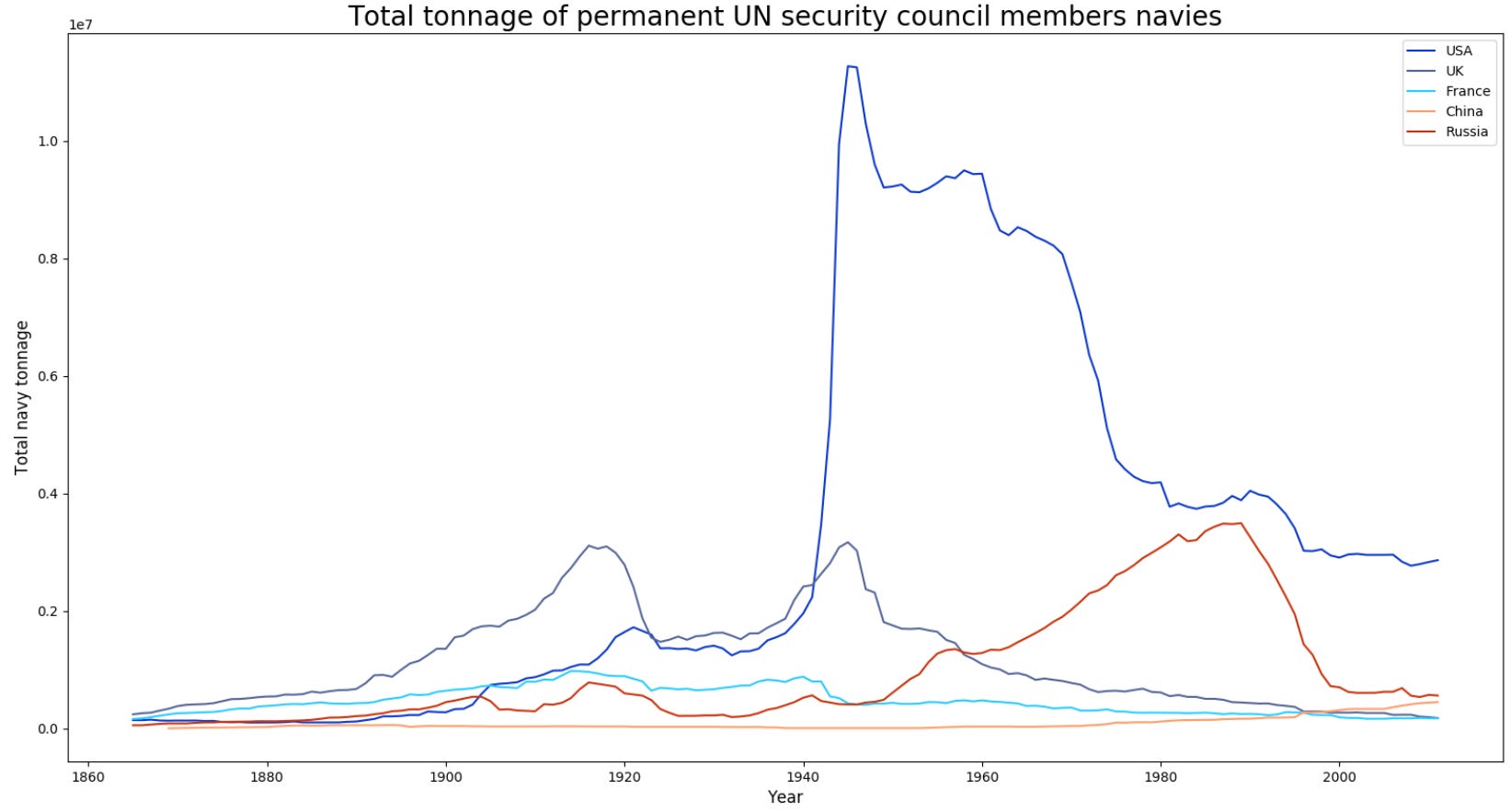
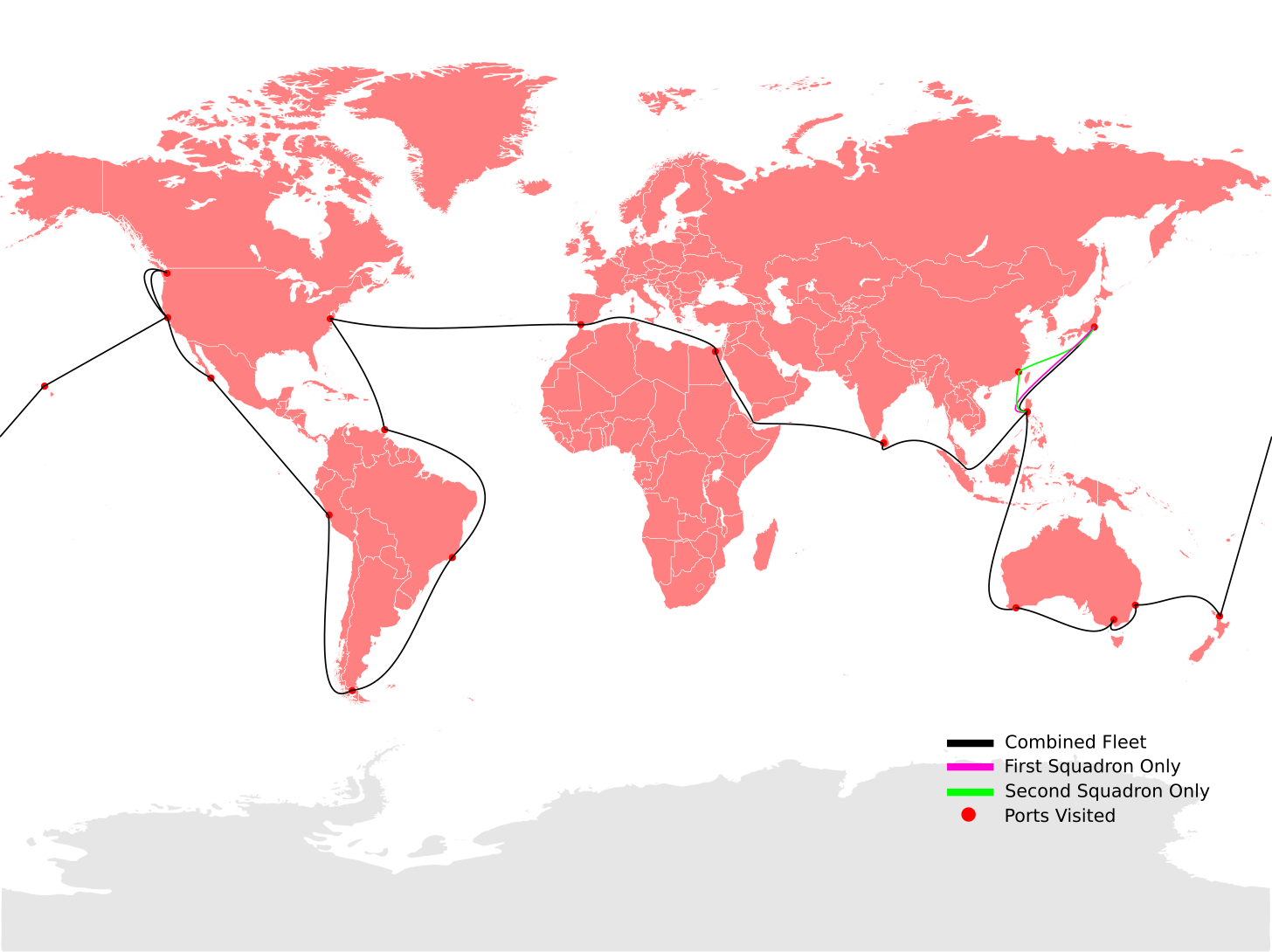
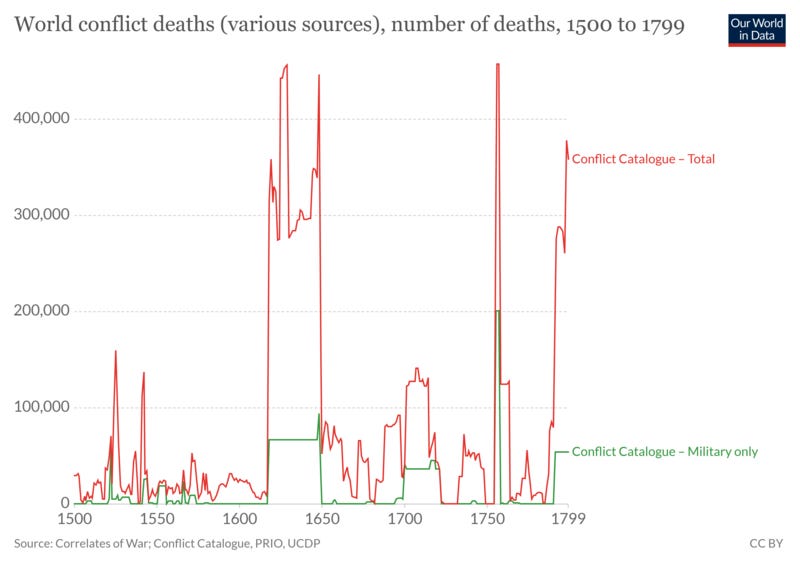

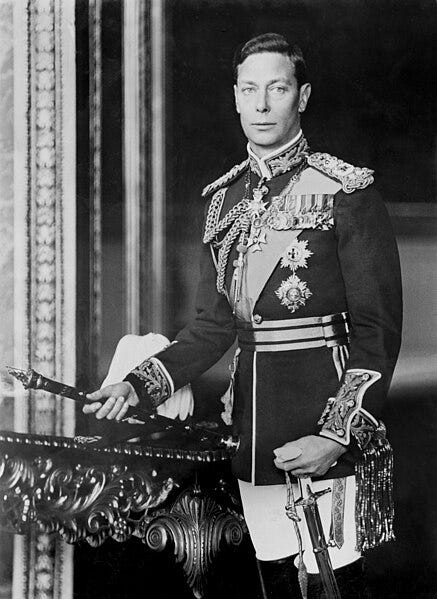
This kind of great power cynism is simply outdated! America is not an Empire, but an Hegemonic country that leads the “Pax Democrática” system.
As a democracy, America do not want annex territory, and land and physical resources are less important in our time, so the historical experience of imperialism is less valuable to understand our world.
https://forum.effectivealtruism.org/posts/vjQ5BhKnDyY35dXXf/chomsky-vs-pax-democratica
You are correct that the whole point of the Buchanan/Cooper school of revisionism is to portray WW2 as a war America was dragged into. People get angry at the implication that it was Jews who dragged America into war, but they are just as happy to blame the Brits, the Poles or anyone really.
In general, WW2 revisionism is one of those cases that points to liberalism being the best of all possible political worlds. The official story is kind of nonsense, but all of the alternative stories that are able to actually get any popular traction are even more nonsense.